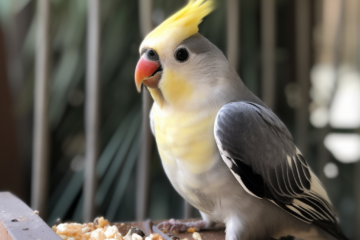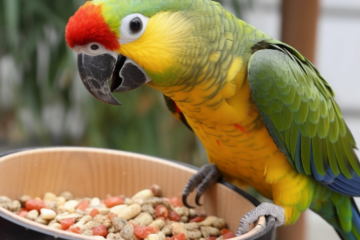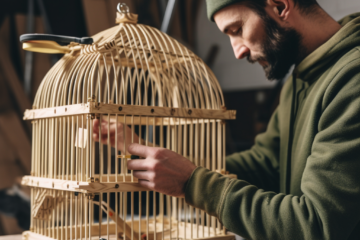Welcome to the ultimate pet parrot care guide! Whether you’re a new bird owner or looking to enhance your feathered friend’s well-being, this comprehensive guide has got you covered. From setting up the perfect habitat to understanding your parrot’s dietary needs and fostering a strong bond, we’ll navigate through every aspect of responsible parrot ownership. Get ready to unlock the secrets of keeping your chirpy companion healthy and happy. Say goodbye to confusion and hello to expert tips that will make caring for your pet parrot a breeze!
Pet Parrot Care Basics
Providing a Comfortable Environment
Ensure your pet parrot has a spacious cage with room to move and stretch its wings. Include perches, toys, and dishes for food and water. Place the cage away from drafts or direct sunlight.
Creating a comfortable space includes providing fresh water daily, cleaning the cage regularly, and offering a varied diet rich in fruits, vegetables, seeds, and pellets. Monitor the temperature to keep your parrot cozy.
Regular Interaction for Trust
Interacting with your pet parrot daily helps build trust and strengthens your bond. Spend time talking to it or teaching it simple words or phrases. Offer treats as rewards for positive behavior.
Engage in activities like training sessions or allowing supervised out-of-cage playtime to keep your parrot mentally stimulated. Physical touch through gentle petting can also help create a sense of security.
Understanding Parrot Nutrition
Balanced Diet
Parrots require a balanced diet to thrive. Offer them a mix of fresh fruits, vegetables, pellets, and seeds. This variety ensures they receive essential nutrients for their overall health. For example, you can provide your pet parrot with apples, carrots, leafy greens like kale or spinach, along with high-quality pellets specifically formulated for parrots.
A balanced diet is crucial for your pet’s well-being as it helps prevent nutritional deficiencies and keeps them healthy in the long run. While seeds are a favorite among many parrots due to their taste, they should not be the sole component of their diet. Seeds lack certain essential nutrients that fruits and vegetables can provide. Therefore, incorporating a diverse range of foods into their daily meals is key to ensuring optimal nutrition.
Toxic Foods
It’s vital to be aware of foods that are harmful to your pet parrot. Avoid feeding them toxic foods like chocolate, avocado, and caffeine as these can be detrimental to their health and even fatal in some cases. Chocolate contains theobromine which is toxic to birds; avocado has persin which is harmful; caffeine affects their heart rate and can lead to serious complications.
-
Pros:
-
Offering a balanced diet ensures proper nutrition.
-
Knowing toxic foods prevents accidental harm.
-
Cons:
-
Balancing different food types may require effort.
-
Some popular human foods are dangerous for parrots.
Consulting an avian veterinarian is highly recommended when determining the best nutrition plan for your pet parrot because they have specialized knowledge on bird care needs including dietary requirements tailored specifically for each species of parrot.
Setting Up Your Parrot’s Living Space
Spacious Living Area
Creating a roomy and engaging living space is crucial for your pet parrot’s well-being. Ensure the area allows your parrot to move around freely, stretch its wings, and explore. Include various perches at different levels to encourage exercise and prevent boredom.
A spacious environment will help your parrot feel safe and comfortable. It should have enough room for flying from perch to perch without obstacles in between. Having ample space allows you to place toys strategically throughout the area for mental stimulation.
Perches and Materials
When setting up your pet parrot’s living space, incorporate a variety of perches made from different materials like wood or rope. These diverse textures are essential for promoting foot health by exercising their feet muscles naturally as they grip onto the perches. Rotating perches regularly can also prevent foot sores.
Including natural branches in the cage not only provides variation but also mimics their natural habitat better than artificial ones do. This helps maintain their beak condition too since they enjoy chewing on branches.
Toys and Enrichment Activities
To keep your pet parrot mentally stimulated, introduce an array of toys that encourage play and engagement. Puzzle feeders, bells, ropes, swings, ladders – all these enriching activities help prevent boredom and behavioral issues in captive birds.
It’s essential to rotate toys regularly to maintain interest levels high; this way, they won’t get bored with them quickly. Interactive toys like treat-dispensing puzzles challenge their minds while keeping them engaged physically.
Choosing the Right Cage for Your Parrot
Proper Sizing
When selecting a cage for your pet parrot, it is crucial to consider the size that suits its species. Different species have varying space requirements. For example, larger parrots like macaws need more room to spread their wings and move around freely compared to smaller species like budgies.
A spacious cage allows your feathered friend to exercise and play comfortably. It should be large enough for the bird to fully extend its wings without touching the sides of the cage. This freedom of movement prevents stress and promotes overall well-being in your pet.
Essential Features
Apart from size considerations, ensure that the chosen cage has secure locks to prevent accidental escapes and potential hazards. Opt for cages made from non-toxic materials as birds tend to chew on their surroundings. Easy cleaning features such as removable trays or grate bottoms facilitate maintenance and hygiene.
To provide a safe environment for your parrot, avoid cages with sharp edges or exposed wires that could harm your pet. A sturdy perch inside the cage is essential for resting and exercising feet muscles. Consider adding a water bottle attached securely within reach of your bird’s perching spot.
Essential Parrot Grooming Practices
Nail Trimming
Regular nail trimming is crucial for grooming your pet parrot. Overgrown nails can cause discomfort and even lead to injuries. To prevent this, use specialized bird nail trimmers to keep their nails at an appropriate length. It’s best to have a professional demonstrate the correct technique before attempting it yourself.
Properly trimmed nails will help your parrot grip perches better and reduce the risk of scratches during handling. Remember not to cut too close to the quick, which is a vein inside the nail, as it can cause bleeding and pain for your feathered friend.
Bathing Techniques
Bathing plays a vital role in maintaining good grooming habits for your parrot. While some birds enjoy bathing in shallow water dishes or under gentle mist sprays, others prefer steamy showers or being lightly sprayed with lukewarm water. Understanding your parrot’s preferences will make bath time less stressful for them.
Regular baths help remove dust and dirt from feathers, keeping them clean and healthy while preventing skin issues like dryness or mites. Be cautious not to bathe your parrot too frequently as excessive moisture can lead to fungal infections on their skin.
Feather and Beak Care
Feathers are essential for flight, insulation, and overall health in birds; therefore, proper feather maintenance is crucial when considering pet parrot care.
-
Regularly check their feathers for signs of damage or abnormalities.
-
Provide opportunities for preening by offering safe toys that encourage natural grooming behaviors.
-
Ensure a balanced diet rich in nutrients necessary for healthy feather growth.
Maintaining a clean beak is equally important since it’s used not only for eating but also climbing and playing activities.
-
Monitor their beak regularly for any overgrowth that may hinder normal functions.
-
Offer mineral blocks or safe chew toys to help naturally wear down their beaks.
Socializing and Bonding with Your Parrot
Daily Interaction and Playtime
Interacting daily with your pet parrot is essential for their well-being. Spend quality time talking to them, singing, or playing games like peek-a-boo. This helps build a strong bond between you and your feathered friend.
Playing with toys can also be beneficial for exercise and mental stimulation. Introduce different toys like bells, ropes, or puzzles to keep them entertained. Ensure the toys are safe and suitable for your parrot’s size and species.
-
Interact daily through talking, singing, or playing games
-
Toys provide exercise and mental stimulation
Positive Reinforcement Training
Using positive reinforcement techniques such as treats when they exhibit good behavior can help in training your parrot effectively. Rewarding desirable actions encourages them to repeat those behaviors in the future.
-
Use treats to reinforce good behavior
-
Rewards encourage desired actions
Gradual Exposure to New Experiences
Introducing new experiences slowly is crucial for helping your parrot socialize better with people and other pets. Start by exposing them to different environments within your home before venturing outside.
Providing Mental Stimulation for Your Parrot
Interactive Toys and Games
Introducing toys like puzzle feeders, treat balls, or shreddable toys can provide mental enrichment for your pet parrot. These items stimulate their natural instincts to explore and forage. By rotating these toys regularly, you prevent boredom and encourage your parrot to engage in different activities each day. This variety helps keep them mentally sharp and prevents behavioral issues that may arise from monotony.
Parrots are intelligent creatures that thrive on interaction. Consider playing interactive games with your bird, such as teaching them how to solve simple puzzles or engaging in mimicry games where they imitate sounds or movements. These activities not only offer mental stimulation but also strengthen the bond between you and your feathered friend.
Teaching New Tricks
Teaching your parrot new tricks or commands is an excellent way to engage their cognitive abilities. Start with simple commands like “step up” or “wave hello,” using positive reinforcement techniques such as treats or verbal praise when they successfully perform the desired action. This process not only challenges their intellect but also provides a rewarding experience for both you and your pet.
Incorporating fresh fruits into training sessions can be beneficial since many parrots enjoy these treats and find them motivating during learning exercises. The combination of mental stimulation through learning new tricks along with the enjoyment of tasty rewards creates a positive environment for helping your parrot stay mentally active.
Recognizing Signs of Illness in Your Parrot
Changes Indicating Illness
Watch for any changes in appetite, behavior, or droppings that may signal illness. A sudden decrease in food consumption, unusual behaviors like lethargy or aggression, or alterations in the droppings’ color and consistency could be signs of an underlying health issue. If you notice these changes persisting for more than a couple of days, it’s crucial to take action promptly.
Parrots have strong survival instincts that often cause them to hide signs of weakness. This means that by the time symptoms become noticeable, the illness might have already progressed significantly. Regularly monitoring your parrot’s well-being is essential to catch any potential health concerns early on.
Physical Symptoms to Observe
Keep an eye on your parrot’s breathing patterns; rapid or labored breathing can indicate respiratory problems. Pay attention to its feather condition and overall appearance – any disheveled feathers or unkempt appearance could point towards health issues. A healthy diet plays a significant role in maintaining your pet bird’s well-being; ensure they are receiving a balanced diet suitable for their species.
Health issues can arise unexpectedly even with proper care and nutrition provided to your pet parrot. In such cases, prompt veterinary intervention is crucial for accurate diagnosis and treatment. Delaying medical attention when abnormal symptoms manifest can lead to complications that might affect your parrot’s long-term health.
-
Monitor: appetite changes, behavior shifts
-
Observe: breathing patterns, feather condition
-
Act
Avian Veterinary Care for Your Pet Parrot
Regular Check-ups
Scheduling regular check-ups with an avian veterinarian is crucial for your pet parrot’s care. These visits ensure your parrot’s overall health and well-being. During these appointments, the vet will discuss important aspects such as vaccination, parasite prevention, and routine blood tests.
Make sure to follow the veterinarian’s recommendations on how to properly care for your new pet parrot. By adhering to their advice, you can prevent potential health issues and address any concerns promptly. Regular check-ups also provide an opportunity to ask questions about your parrot’s diet, hygiene practices, and general care needs.
Professional Guidance
Avian veterinarians are specially trained to handle the unique needs of pet birds like parrots. They can offer valuable insights into maintaining your bird’s health and happiness. Discussing dietary requirements with the vet ensures that your parrot receives a balanced diet rich in essential nutrients like vegetables.
Avian veterinarians can provide expert guidance. Their expertise helps you navigate various aspects of caring for a pet bird effectively while addressing any concerns or questions you may have along the way.
You’ve now got a solid grip on the essentials of caring for your pet parrot. From understanding their nutrition needs to creating a stimulating living environment, you’re well-equipped to ensure your feathered friend lives a happy and healthy life. Remember, grooming, socialization, mental stimulation, and regular veterinary check-ups are all key aspects of being a responsible parrot owner. By following these guidelines, you’re not just taking care of a pet; you’re nurturing a bond that brings joy and companionship into your life.
Now it’s time to put this knowledge into action. Take the next step by implementing these tips and tricks in your daily routine with your parrot. Your efforts will not only benefit your feathered companion but also strengthen the unique connection you share. Keep learning, exploring, and growing together with your beloved pet!
Frequently Asked Questions
Is it important to provide mental stimulation for my pet parrot?
Yes, mental stimulation is crucial for your pet parrot’s well-being. Offer toys, puzzles, and interactive activities to prevent boredom and encourage natural behaviors.
What are the signs of illness I should watch out for in my pet parrot?
Signs of illness in a parrot include changes in appetite, behavior, droppings consistency/color, breathing difficulties, or feather abnormalities. Consult an avian vet if you notice any concerning symptoms.
How can I create a suitable living space for my pet parrot?
Ensure your parrot’s living space is spacious with perches at various heights, toys for enrichment, natural light exposure (but avoid direct sunlight), and proper ventilation. Keep the area clean to prevent health issues.
Why is socializing and bonding important with my pet parrot?
Socializing helps build trust between you and your parrot. Spend quality time interacting with your bird daily through talking, playing games, or training sessions. This strengthens your bond and contributes to their emotional well-being.
Do I need specific grooming practices for my pet parrot?
Yes, regular grooming is essential for a healthy bird. Trim nails as needed to prevent overgrowth or injury; bathe them occasionally using lukewarm water; check feathers for damage or parasites regularly.


